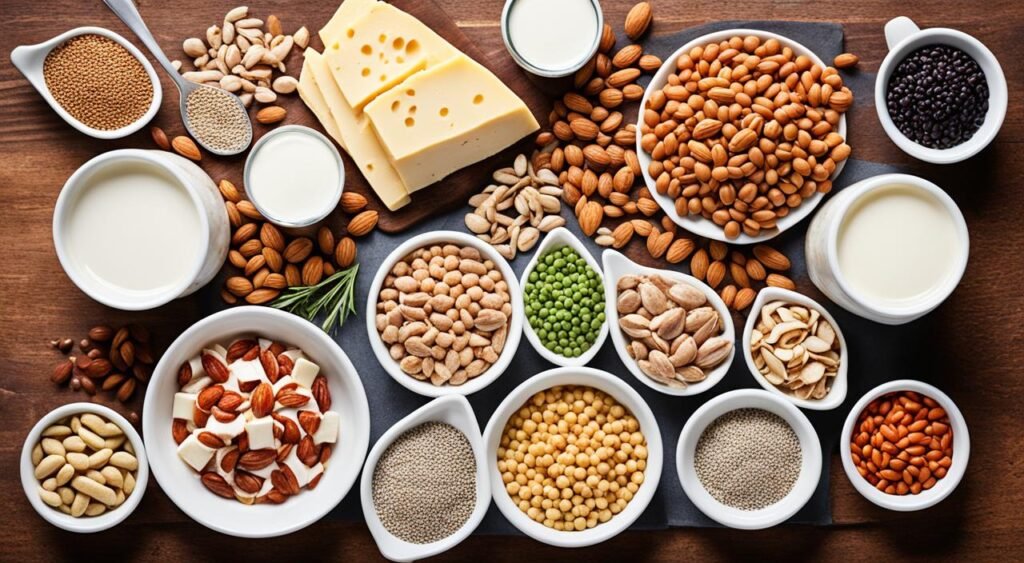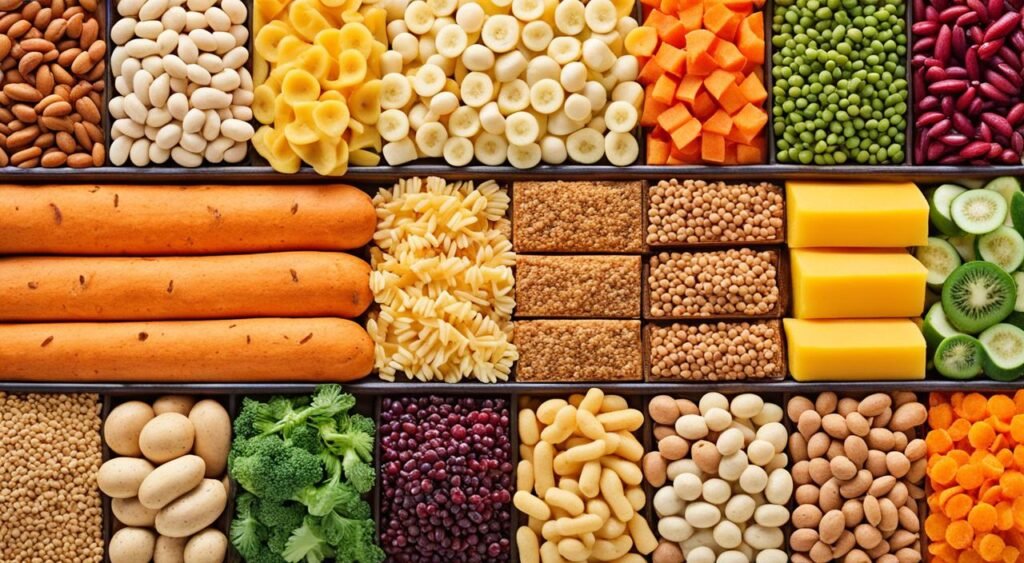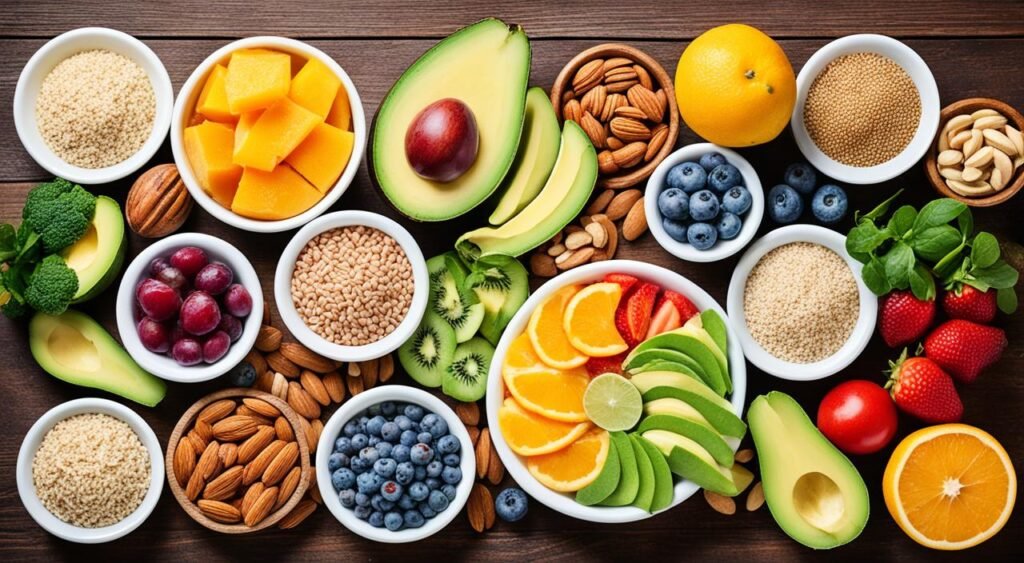Eating a balanced diet is key for our health. Our bodies need six main nutrients. These are vitamins, minerals, protein, fats, water, and carbohydrates. We must get these nutrients from our food.
These nutrients are vital for our body’s functions. They help with things like growth, staying healthy, and the ability to have kids. Nutrients fall into two groups: micronutrients and macronutrients. Micronutrients include vitamins and minerals. We need these in smaller amounts. For macronutrients, which are water, protein, carbs, and fats, we need more. It’s important to eat a variety of foods to get all the nutrients we need.
Key Takeaways
- The six essential nutrients for a healthy diet are vitamins, minerals, protein, fats, water, and carbohydrates.
- Essential nutrients are divided into two categories: micronutrients and macronutrients.
- Micronutrients, such as vitamins and minerals, are needed in smaller amounts, while macronutrients, including water, protein, carbohydrates, and fats, are needed in larger quantities.
- Consuming a balanced diet that includes all six essential nutrients is crucial for maintaining overall health and well-being.
- A healthy, balanced diet can typically provide all the essential nutrients the body needs, but some individuals may require supplements due to medical conditions or dietary restrictions.
Also Read : What Are The Best Exercises For A Daily Workout?
Understanding Essential Nutrients
Essential nutrients must come from food because our bodies can’t make them enough. There are micronutrients, which we need in small amounts, like vitamins and minerals. Then, there are macronutrients that we need more of, such as water, protein, carbohydrates, and fats.
Also Read : How Can You Prevent Chikungunya ?
Micronutrients and Macronutrients
Micronutrients help our bodies work right. Macronutrients give us energy and what we need to grow. It’s key to eat a mix of them for good health.
Importance of a Balanced Diet
Eating from all six essential nutrient groups is key for our bodies to function well. A varied diet with veggies, fruits, lean meats, good fats, and carbs can provide all we need.
Knowing about micro and macronutrients helps us pick foods that fit our health and fitness plans. This way, we support our well-being and energy levels.
Also Read : What Are The Health Benefits Of Cycling Regularly?
Vitamins: Tiny but Mighty

Vitamins are small but powerful. They give our body important benefits. These benefits include making our immune system stronger, fighting certain cancers, and building strong teeth and bones. They also help our bodies use calcium better and keep our skin healthy.
These micronutrients help our body process proteins and carbs. They also keep our blood healthy and support how our brain and nervous system work.
Also Read : Exploring PHD Scholarship Opportunities In 2024
Fat-Soluble Vitamins
Thirteen key vitamins are split into groups. One group is fat-soluble, including vitamins A, D, E, and K. The body takes in these vitamins with fats. It then stores them for later in the liver and fats.
Water-Soluble Vitamins
Water-soluble vitamins are a different group. They are vitamins C and the B vitamins. Since they mix with water, our body doesn’t hold onto them. So, we need to eat foods or take supplements with these vitamins every day.
Also Read : Exploring Global PhD Scholarship Opportunities For Graduated Students
Vitamin-Rich Food Sources
Eating lots of vegetables, fruits, and lean proteins helps you get enough vitamins. But sometimes, people need more. This includes those who don’t eat many fruit and vegetables. Also, sometimes people with stomach issues need a vitamin supplement to keep from lacking in vitamins.
Minerals: Building Blocks of Health
Minerals are a vital part of a healthy diet and are divided into two categories. Major minerals and trace minerals are both important. They help our bodies do many things like keeping our bones and immune system strong.
Major Minerals
Major minerals, like calcium and phosphorus, are needed in big amounts. They are key for strong bones and teeth. Magnesium, on the other hand, controls our blood pressure and helps muscles and nerves work.
Sodium, potassium, and chloride maintain our fluid balance and keep our hearts healthy.
Trace Minerals
Trace minerals are needed in small doses but are just as crucial. This group includes iron, zinc, and iodine. Iron carries oxygen around your body, zinc boosts your immunity, and iodine is vital for your thyroid.
Selenium is another trace mineral that acts as an antioxidant, protecting our cells.
Eating a diet full of varied, nutrient-rich foods is the best way to get enough minerals. Include items like red meats, seafood, and plenty of fruits and vegetables. This maintains a good balance of minerals for your body’s functions.
| Major Minerals | Trace Minerals |
|---|---|
| Calcium, Phosphorus, Magnesium, Sodium, Potassium, Chloride | Iron, Zinc, Iodine, Copper, Manganese, Fluoride, Selenium |
| Help regulate fluid balance, maintain healthy bones and teeth, support heart health | Aid in oxygen transport, immune function, thyroid health, antioxidant protection |
| Found in dairy products, leafy greens, nuts, beans, whole grains | Found in meat, seafood, nuts, seeds, fortified foods, vegetables |
Protein: The Essential Macronutrient

Protein is vital for the body. It is needed by every cell to work well. Proteins help with things like growth and development of muscles, bones, hair, and skin. They also make antibodies, hormones, and other crucial substances.
Proteins even act as a fuel for cells and tissues. You can get protein through your diet. Red meats, poultry, fish and seafood, beans and legumes, eggs, dairy products, soy, nuts, and quinoa are good sources. Although meats and fish are high in protein, vegans and vegetarians can find enough protein in plant foods.
Functions of Protein
Protein plays a key role in the body. It helps with:
- Tissue growth and repair – It’s vital for muscles, bones, skin, and other tissues.
- Immune function – It creates antibodies to fight illnesses.
- Enzyme production – These are needed for chemical reactions.
- Hormone regulation – Helps control many body processes.
- Energy provision – Can be used for energy when other sources are low.
Protein Sources
We find protein in many foods. Some of the best protein-rich foods are:
- Animal-based sources: Meat, poultry, fish, eggs, and dairy
- Plant-based sources: Beans, lentils, nuts, seeds, soy, and grains like quinoa
Animal foods often have complete proteins. But plant-based foods can also be good. Just make sure to eat a mix of such foods if you follow a vegan or vegetarian diet.
Healthy Fats: Not the Enemy

Many think that eating high-fat foods is bad for health. But, the truth is, our bodies need certain fats for good health. Fats give us energy and help our bodies work well. Yet, it’s vital to choose the right fats. Focus on healthful fats like monounsaturated and polyunsaturated fats. Try to avoid ones that are not so good, like saturated and trans fats.
Benefits of Healthy Fats
Healthful fats are important for many reasons. They help our cells grow and keep our blood from clotting too much. They lower the chance of heart disease and type 2 diabetes. They also help us move our muscles and keep our blood sugar in check. Plus, they support our brains, help us absorb vitamins and minerals, make hormones, and boost our immune system. To stay healthy, about 20 to 35% of our daily calories should come from these good fats, say the Dietary Guidelines for Americans.
Sources of Healthy Fats
Where can you find these healthy fats? Think about adding foods like nuts, fish, vegetable oils, seeds, and avocados to your meals. Mixing these nutrient-rich foods in your daily eating helps make sure you get enough good fats. They’re key for health and maintaining weight.
Carbohydrates: The Body’s Fuel

Carbohydrates are like the body’s gas. They are sugars or starches that power every cell and tissue. Carbohydrates are crucial for our immune system and brain function. They also keep the nervous system working well and our energy levels up. Understanding simple and complex carbohydrates helps us keep a balanced diet. This keeps us healthy and happy.
Simple vs. Complex Carbs
Carbs come in two types: simple and complex. It’s best to eat fewer simple carbohydrates, like white bread, pasta, and rice. These make blood sugar spike and only give quick energy. A better choice is complex carbohydrates. They are broken down slowly, giving us energy that lasts.
Carbohydrate-Rich Foods
As per the Dietary Guidelines for Americans, many of our calories should come from complex carbohydrates. Aim to get 45-65% of your daily calories from them. They are in foods like quinoa, brown rice, vegetables, and more. Including these foods in your meals maintains good well-being.
| Simple Carbohydrates | Complex Carbohydrates |
|---|---|
| White bread, pasta, and rice | Quinoa, brown rice, vegetables, whole grain pasta and bread, oatmeal, fruits, and barley |
| Provide a quick, but short-lived, burst of energy | Digested more slowly, providing a more sustained source of energy |
| Can spike blood sugar levels | Support the immune system, brain function, nervous system, energy levels, and digestive function |
| Should be limited in a healthy diet | Should make up 45-65% of daily calorie intake, according to Dietary Guidelines for Americans |
Diet: The Key to Nutritional Balance

Eating a balanced diet is important for our health and well-being. A diet rich in lean proteins, vegetables, fruits, and complex carbohydrates is beneficial.
Balanced Diet Plan
To maintain good health, a balanced diet plan is key. It ensures we get the right amount of macronutrients and micronutrients. Setting up a plan with the right meal planning and portion control is vital for well-rounded nutrition.
Meal Planning and Portion Control
Meal planning and portion control keep our diet balanced. They help us watch our portion sizes and avoid eating too much. This way, we can take in the right nutritional needs without overdoing calories or macronutrients.
If someone has digestive issues or takes specific medications, they might need supplements. It’s best to check with a doctor or a dietitian first. They can suggest which supplements to take safely.
Also Read : Explore The Best Of Liberty Health Sciences Today
Water: The Essence of Life
Water is crucial for our health and body. It makes up most of our bodies, and we need it for every cell to work. This essential nutrient does a lot of important jobs. It flushes out toxins, cushions us from shocks, and carries nutrients. It also helps prevent constipation, keeps us moving smoothly, and keeps us hydrated. Not drinking enough water can lead to headaches and make it hard to think or move.
Importance of Hydration
Keeping hydrated is key to feeling your best. Water helps with body temperature, digestion, and keeps our systems working well. Being properly hydrated stops us from gaining unwanted weight, makes us more energetic, and helps us think sharp.
Staying Hydrated
The best water sources are clean, unsweetened water from taps or bottles. Fruits and vegetables also have lots of water. Drinking sugary drinks like soda, sweetened teas, or fruit juices is not good for you. These can actually make you more dehydrated and cause health problems. It’s important to drink water all day and more if you’re active or it’s hot.
Conclusion
A balanced diet includes six key nutrients: vitamins, minerals, protein, fats, water, and carbohydrates. These are vital for growth, keeping the immune system strong, and preventing diseases. Eating a balanced diet rich in lean proteins, veggies, fruits, and complex carbs usually provides these nutrients.
Some may need supplements due to health issues or specific diets. Talking to a healthcare expert or a dietitian is wise for a custom nutrition plan. This plan will meet your unique health goals and needs.
Adding healthy eating habits, meal planning, and controlling portion sizes helps. Making changes to how you live supports a balanced diet. Choosing foods wisely means you’re taking care of your health and well-being.





